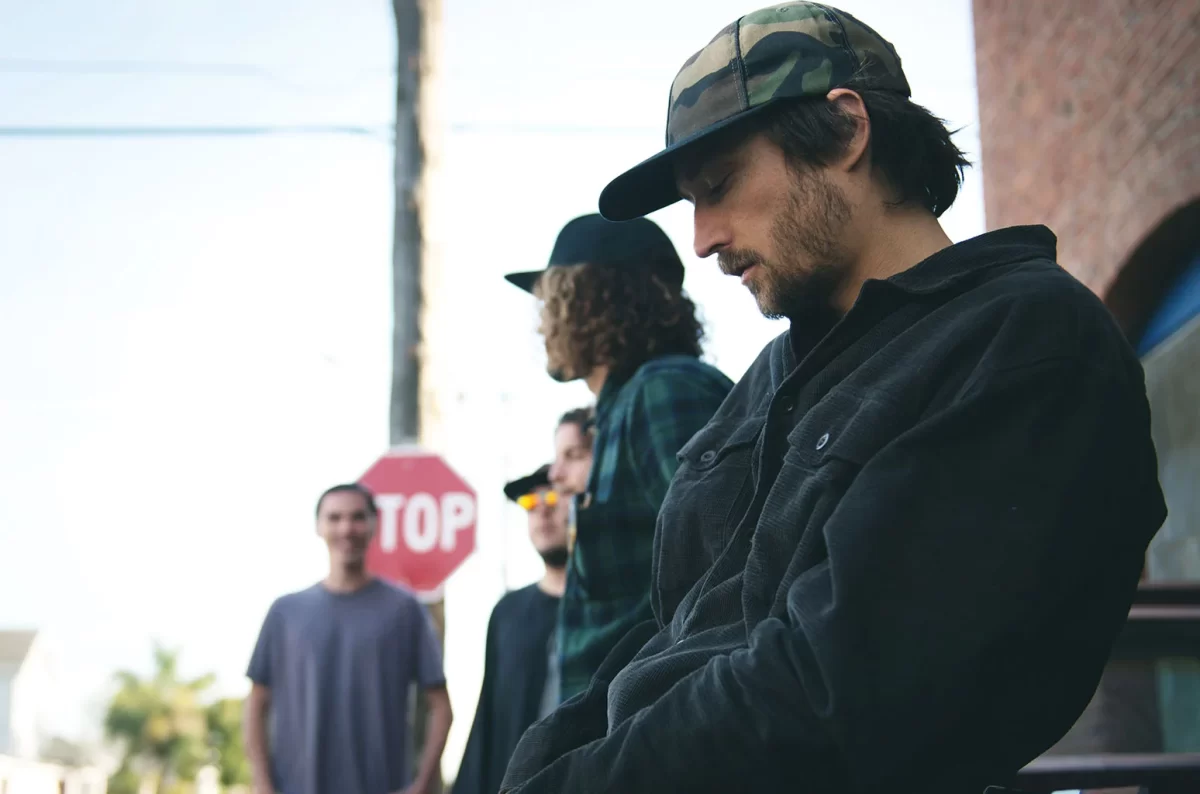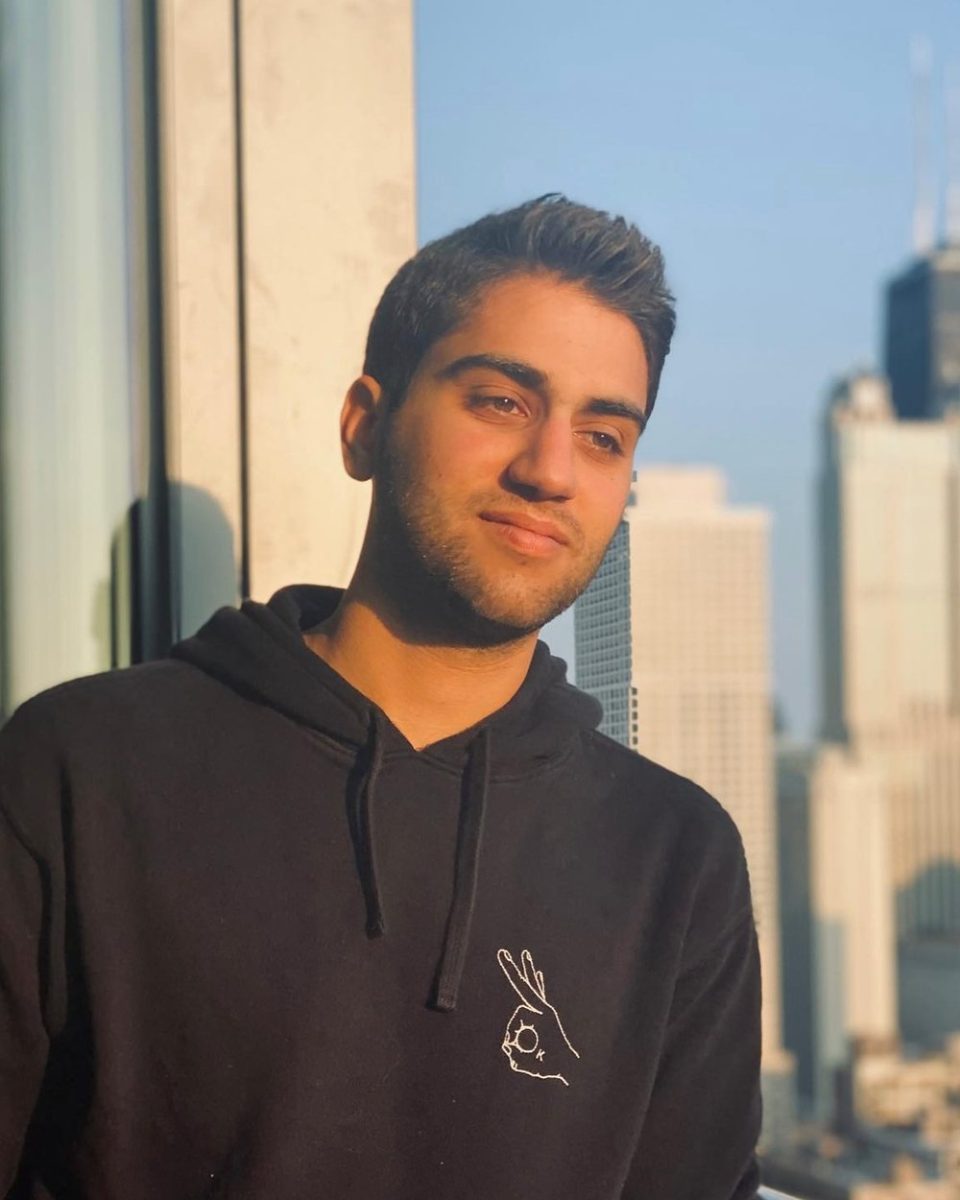Stick Figure’s Billboard Success Is A Lesson In Commitment And Patience, Say Managers

Stick Figure’s music tends to elicit vivid testimonials. In YouTube comments, many fans share how the Reggae band’s songs helped them wade through the currents of grief and depression. Others fondly recall the first “Stick” album they bought or the first show they went to, sometimes more than a decade ago. Some simply draft brief thank-you notes before signing off with a shoutout to the rest of the “Stick Family.”
At live shows, Stick Figure consists of Scott Woodruff, the vocalist; Kevin Bong, the keyboardist; Kevin Offitzer, the drummer; Tommy Suliman, the bassist; Will Phillips percussion; and Johnny Cosmic, the guitarist.
In the studio, it’s mostly Scott.
For over fifteen years, the Massachusetts-born multi-instrumentalist has managed to magnetize ears and hearts with his songcraft. His lyrics are lean and hopeful, speaking to generations of people who find themselves stuck in life, often reminding them that spiritual storms always pass. “Out of the darkness, show me the way / We all get lost, we’ve all been astray,” he affirms on Paradise , the first-released single from his latest self-produced album, Wisdom.
“I don’t try to write three-minute pop songs or sacrifice anything about the music to get it on the radio,” he told Billboard in 2019. Fans appreciate this. So much so, in fact, that they come out in droves to support Stick Figure’s studio releases, concerts, and merch drops. “Just bought 5 copies of the CD for friends/family,” reads one YouTube comment. This level of enthusiasm is reflected in the official numbers; Wisdom sold 13,900 units in its first week, making it the fourth consecutive Stick Figure album to debut at No. 1 on Billboard’s Reggae Albums chart. As of September 23, the album’s total sales, including pre-released tracks, totaled over 41,000 units.
And the fact that Scott has remained independent and retained ownership of his masters makes this commercial feat all the more impressive.

Since 2012, Ineffable Music has helped Scott scale up his once-DIY operation. The Oakland, California-based music company now manages Stick Figure, along with a roster of notable Reggae acts including Collie Buddz, The Movement, and Iya Terra.
Founded in 2006 by college roommates Thomas Cussins and Igor Katz, Ineffable initially sought to serve areas of the music business that were being overlooked, namely touring, merchandising, and Reggae as a whole. Since then, the company has expanded considerably, developing its own Reggae-oriented ecosystem through artist management, music festival production, venue ownership and operation, and a record label.
At the heart of all of this is a push for artists to maintain control and ownership of their music.
DancehallMag recently spoke on the topic of achieving success as an independent artist with some of the leaders at Ineffable Music: Thomas Cussins, the president of Ineffable Music; Adam Gross, the VP of Ineffable Records, the company’s label division; and Marina Petros, VP of Artist Management and Venue Operations.
Here are ten of their recommendations.
1. Determine Your Level of Commitment
Long-term success in music is always by design. Before an artist can build a life out of music, they should ask themselves how much they’re willing to sacrifice and endure in the process.
“Most importantly, ask yourself, ‘Am I all in?’ So many people want to do music as a career that, unless you’re 100% sure this is the most important thing to you and you’re willing to put everything aside for it, it’s very hard to make a living and make a career out of music,” said Thomas Cussins.
2. Develop Your Sound
“One of the keys to establishing a long-term fan base as an independent artist is finding out what your sound is and then sticking with it. With Stick, there’s this sound that’s consistent throughout all his projects. Even if it gets more professional-sounding with each release, people know what to expect from him,” Adam Gross said.
Before Scott Woodruff even began doing national tours, he spent the first six years of his career fine-tuning his sound across five albums.
“Focusing on the music and building his sound was always a priority. And then the music was at this place where, when he went on the road, there was already an audience for it and he could build it from there,” Cussins added.

3. Take Advantage of the Technology
“As the landscape of music constantly changes, one major thing artists should focus on is studying the places where people are placing their attention and then learning to speak the language of these various platforms,” Gross said.
“All the platforms – Youtube, Instagram, TikTok, and so on speak a different language. And if an independent artist is continually evolving and learning how to optimize on all of those places, they can be in a position where they can reach a huge audience over time without having a crazy investment or the backing from a major label or anything like that.”
Cussins stressed that it’s just as important to spread yourself across many of these platforms rather than to rely on any single one.
“There were no Spotify playlists for Stick Figure prior to 2018 – but we didn’t need that. We weren’t ever relying on one thing; we’re constantly trying as many things as we can, adjusting, and evolving,” Cussins said.
It’s also key to take advantage of these platforms’ metrics and insights.
“One of the most important things to look out for as an artist is: what’s the ratio between your total listenership and your core following? There are different ways you can gauge that. You can look at how many followers you have on a social media platform versus how many people are actually liking and commenting. Or you see how many monthly listeners you have on Spotify versus how many actual followers you have,” said Gross.
“The development of the core fan base is the most crucial factor because it’s not reliant on outside forces or trying to get that one hit or trying to get lucky with this or that.”

4. Make Yourself Accessible to Fans
This point goes hand in hand with taking advantage of the available platforms.
“Being in communication with folks, being accessible, and staying authentic are all so important,” Cussins said.
“People know if you’re being authentic or if it’s some manufactured bubblegum thing, you know? And instead of spending a bunch of money at the early stages, artists can take advantage of the ability to respond to fans in comments and emails. If anybody emails from the Stick Figure website, we’re gonna see it and we’re gonna respond to it.”
“Artists should learn how to create content that their fans want to see or that they’re gonna engage with. It’s important not to make it ‘salesy’ or seem like you’re asking people to buy something. There’s almost this sort of fan karma meter. You wanna be providing value to people because this music really means something in their lives,” Gross added.
5. Broaden Your Skillset
Ineffable’s team believes that maintaining a DIY attitude in certain areas can carry artists further in their careers.
“How much can you do yourself? Can you handle your own videography in the beginning? Make your own music videos? That could potentially save thousands of dollars on each video and help with the process of building a fanbase,” said Cussins.
Even as his team has expanded considerably, there are still many tasks that Scott Woodruff prefers to do on his own.
“A big part of the Stick Figure success story is that every single thing you see on his Instagram, he’s the person who presses post. There’s no team that came up with his feed. He’ll even edit together some of his own video clips and post them. This all stems from him understanding his brand and his fan base at such a high level, too,” added Gross.
6. Stay Organised
“One of the things that Ineffable focuses on with our management clients is just having everything as organised as possible. That goes for the artwork, the song files, the metadata for every song, and all the ISRC and UPC codes. These are all necessary for moving forward as an artist,” said Marina Petros, Ineffable’s VP of Artist Management and Venue Operations.
In the long run, Petros says, this saves time and energy when it comes to things like updating artists’ profiles on digital streaming platforms or jumping on board with emerging tech like NFTs.
“It’s hard to make that stuff happen if an artist can’t find their files from 20 years ago.”

7. Join a Movement
Community is one of the defining features of Reggae music globally and something independent artists should tap into, says Ineffable.
“If you’re an artist from Jamaica or Trinidad or New Zealand and you come and play at a festival like Cali Roots, you’re gonna leave with new fans that are gonna support you forever,” said Cussins.
“At these festivals, it’s really all about getting a community rallying around a scene and focusing on this scene being really strong because we want fans to keep supporting all these artists for twenty-plus years – not just whenever they have a hit song.”
This applies to studio recordings, too. In 2020, Ineffable Records released Cali Roots Riddim 2020, a 22-track juggling produced by Collie Buddz and featuring acts from Anthony B to SOJA to Jesse Royal. This project served a dual purpose: introducing many American reggae fans to a vital part of Jamaican music culture while also introducing them to artists that they might not have heard otherwise.
A landmark moment for Ineffable came when Anthony B wrapped up a show and drove an hour and a half to join Collie Buddz on stage at the 2022 California Roots Festival. Arriving at the last minute, he ran to the set – dubbed Collie and his Buddz – and performed his hit version of the Cali Roots Riddim 2020, Chill Out, to the delight of fans, including Ineffable’s team.
“That moment when Anthony B went on stage and sang his version, we were on the side of the stage jumping up and down like little children. It was just the culmination of what we wanted to achieve with this project — exposing different artists from different parts of the world to each other’s fan bases. Because when that happens, the overall ecosystem of reggae becomes even stronger,” said Gross.
8. Deliver Unique Experiences
Another crucial element to growing and maintaining a fan base is building real-life connections with listeners.
“I’ve always valued a strong grassroots approach — that fan-to-fan, person-to-person, one-at-a-time approach on the road because that connection you can make while touring can be so strong,” Cussins said.
Ineffable and Stick Figure used one such spur-of-the-moment strategy back in 2012 when they first started working together.
“At one show we were at, there was a traffic jam. And so we went from car to car, giving everybody a CD copy of [Stick Figure’s album] Burial Ground, and then the whole traffic jam was just listening to the album a few seconds later,” Cussins recalled.
9. Build a Sustainable Business Model
In addition to shows and merch, royalties generated through licensing their master recordings can be a major source of revenue for any artist. In light of this, it’s crucial for independent artists to strike a sustainable balance between short-term gains and long-term investment when it comes to music ownership.
“In growing the label arm of the business, we wanna do deals where people are recouping and owning their masters, they’re owning their publishing, they’re getting paid out every month, and they feel really good about the work we did together,” said Gross.
“One thing that I’m really proud of is that Anthony B gets a check every month for Chill Out. It wasn’t just a one-time thing. So what we do at Ineffable is try to find the best model and keep improving that and working on that to create something sustainable. That works a lot better than having an artist voice a new song every couple of weeks just to get paid. It also allows people to focus more on building and marketing and other things,” Cussins added.
10. Set Your Own Definition of Success
Finally, independent artists should understand what they’re trying to achieve with a career in music and then measure their success against that standard. Every person’s ideal differs.
“All I really want is for us to be able to do music every day for the rest of our lives and not have to have a real job. We’re not trying to be famous, you know? That stuff doesn’t matter to us. We want to just keep supporting great artists. It builds organically. When we do good work and everyone’s eating at the table together and having a good time, the opportunities present themselves,” Cussins said.
And as headlines flashed with the news that Stick Figure’s latest album Wisdom had overtaken Bob Marley’s Legend at the No. 1 spot on the Billboard Reggae charts, Cussins offered an anecdote on that sort of external recognition.
“The funny thing is that Scott has never looked at a chart in his life. That’s really not what he’s like at all. That’s so anti-his-lifestyle. For me, it’s nice to get recognised for the hard work, because it was a lot of work, it was a lot of planning, and it took a big long build – especially as a completely independent shop,” Thomas said before adding, “But of course, Bob Marley’s the king – regardless of what any headlines say.”
